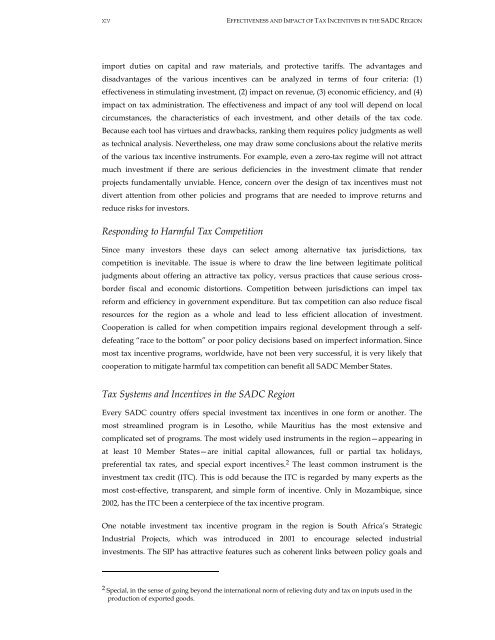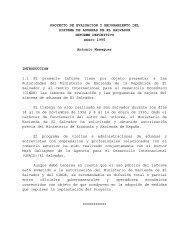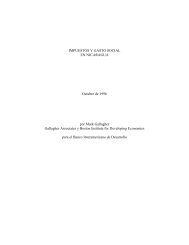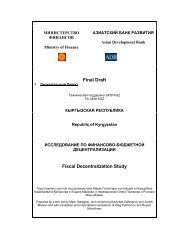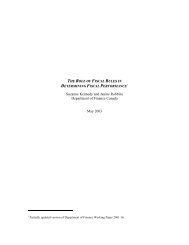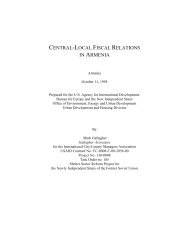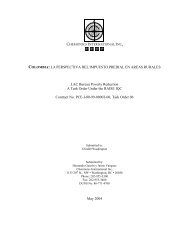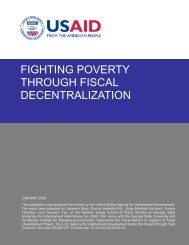Effectiveness and Economic Impact of Tax Incentives in the SADC ...
Effectiveness and Economic Impact of Tax Incentives in the SADC ...
Effectiveness and Economic Impact of Tax Incentives in the SADC ...
Create successful ePaper yourself
Turn your PDF publications into a flip-book with our unique Google optimized e-Paper software.
XIV EFFECTIVENESS AND IMPACT OF TAX INCENTIVES IN THE <strong>SADC</strong> REGION<br />
import duties on capital <strong>and</strong> raw materials, <strong>and</strong> protective tariffs. The advantages <strong>and</strong><br />
disadvantages <strong>of</strong> <strong>the</strong> various <strong>in</strong>centives can be analyzed <strong>in</strong> terms <strong>of</strong> four criteria: (1)<br />
effectiveness <strong>in</strong> stimulat<strong>in</strong>g <strong>in</strong>vestment, (2) impact on revenue, (3) economic efficiency, <strong>and</strong> (4)<br />
impact on tax adm<strong>in</strong>istration. The effectiveness <strong>and</strong> impact <strong>of</strong> any tool will depend on local<br />
circumstances, <strong>the</strong> characteristics <strong>of</strong> each <strong>in</strong>vestment, <strong>and</strong> o<strong>the</strong>r details <strong>of</strong> <strong>the</strong> tax code.<br />
Because each tool has virtues <strong>and</strong> drawbacks, rank<strong>in</strong>g <strong>the</strong>m requires policy judgments as well<br />
as technical analysis. Never<strong>the</strong>less, one may draw some conclusions about <strong>the</strong> relative merits<br />
<strong>of</strong> <strong>the</strong> various tax <strong>in</strong>centive <strong>in</strong>struments. For example, even a zero-tax regime will not attract<br />
much <strong>in</strong>vestment if <strong>the</strong>re are serious deficiencies <strong>in</strong> <strong>the</strong> <strong>in</strong>vestment climate that render<br />
projects fundamentally unviable. Hence, concern over <strong>the</strong> design <strong>of</strong> tax <strong>in</strong>centives must not<br />
divert attention from o<strong>the</strong>r policies <strong>and</strong> programs that are needed to improve returns <strong>and</strong><br />
reduce risks for <strong>in</strong>vestors.<br />
Respond<strong>in</strong>g to Harmful <strong>Tax</strong> Competition<br />
S<strong>in</strong>ce many <strong>in</strong>vestors <strong>the</strong>se days can select among alternative tax jurisdictions, tax<br />
competition is <strong>in</strong>evitable. The issue is where to draw <strong>the</strong> l<strong>in</strong>e between legitimate political<br />
judgments about <strong>of</strong>fer<strong>in</strong>g an attractive tax policy, versus practices that cause serious crossborder<br />
fiscal <strong>and</strong> economic distortions. Competition between jurisdictions can impel tax<br />
reform <strong>and</strong> efficiency <strong>in</strong> government expenditure. But tax competition can also reduce fiscal<br />
resources for <strong>the</strong> region as a whole <strong>and</strong> lead to less efficient allocation <strong>of</strong> <strong>in</strong>vestment.<br />
Cooperation is called for when competition impairs regional development through a selfdefeat<strong>in</strong>g<br />
“race to <strong>the</strong> bottom” or poor policy decisions based on imperfect <strong>in</strong>formation. S<strong>in</strong>ce<br />
most tax <strong>in</strong>centive programs, worldwide, have not been very successful, it is very likely that<br />
cooperation to mitigate harmful tax competition can benefit all <strong>SADC</strong> Member States.<br />
<strong>Tax</strong> Systems <strong>and</strong> <strong>Incentives</strong> <strong>in</strong> <strong>the</strong> <strong>SADC</strong> Region<br />
Every <strong>SADC</strong> country <strong>of</strong>fers special <strong>in</strong>vestment tax <strong>in</strong>centives <strong>in</strong> one form or ano<strong>the</strong>r. The<br />
most streaml<strong>in</strong>ed program is <strong>in</strong> Lesotho, while Mauritius has <strong>the</strong> most extensive <strong>and</strong><br />
complicated set <strong>of</strong> programs. The most widely used <strong>in</strong>struments <strong>in</strong> <strong>the</strong> region—appear<strong>in</strong>g <strong>in</strong><br />
at least 10 Member States—are <strong>in</strong>itial capital allowances, full or partial tax holidays,<br />
preferential tax rates, <strong>and</strong> special export <strong>in</strong>centives. 2 The least common <strong>in</strong>strument is <strong>the</strong><br />
<strong>in</strong>vestment tax credit (ITC). This is odd because <strong>the</strong> ITC is regarded by many experts as <strong>the</strong><br />
most cost-effective, transparent, <strong>and</strong> simple form <strong>of</strong> <strong>in</strong>centive. Only <strong>in</strong> Mozambique, s<strong>in</strong>ce<br />
2002, has <strong>the</strong> ITC been a centerpiece <strong>of</strong> <strong>the</strong> tax <strong>in</strong>centive program.<br />
One notable <strong>in</strong>vestment tax <strong>in</strong>centive program <strong>in</strong> <strong>the</strong> region is South Africa’s Strategic<br />
Industrial Projects, which was <strong>in</strong>troduced <strong>in</strong> 2001 to encourage selected <strong>in</strong>dustrial<br />
<strong>in</strong>vestments. The SIP has attractive features such as coherent l<strong>in</strong>ks between policy goals <strong>and</strong><br />
2 Special, <strong>in</strong> <strong>the</strong> sense <strong>of</strong> go<strong>in</strong>g beyond <strong>the</strong> <strong>in</strong>ternational norm <strong>of</strong> reliev<strong>in</strong>g duty <strong>and</strong> tax on <strong>in</strong>puts used <strong>in</strong> <strong>the</strong><br />
production <strong>of</strong> exported goods.


